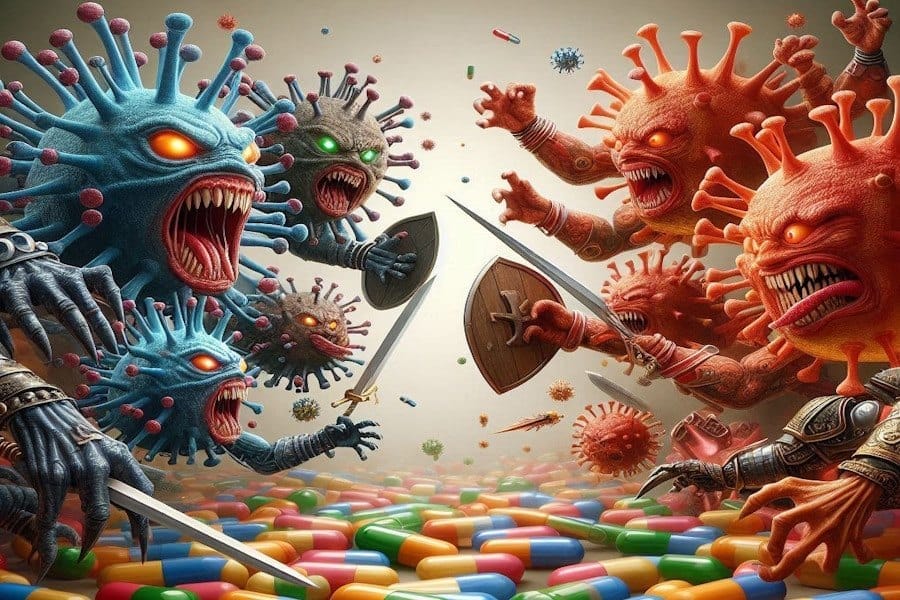Type: Article -> Category: AI Philosophy
The Unintended Consequences of Medical Advancements

Publish Date: Last Updated: 17th February 2026
Author: nick smith- With the help of CHATGPT
The Cycle of Illness
Modern medicine has shifted the focus from curing illnesses to managing them. Conditions that once might have led to early mortality are now treatable, allowing individuals to live longer and reproduce. While this is a triumph of human empathy and technology, it also means that genetic predispositions for these conditions are passed on to future generations, perpetuating cycles of illness.
For instance:
- Chronic conditions like diabetes, asthma, and certain genetic disorders are now more manageable than ever before, but they remain prevalent within the gene pool.
- Mental health conditions, once stigmatized and untreated, are now widely recognized and managed, but their genetic components continue to spread.
This is not to advocate for eugenics or selective reproduction but to highlight that medical advancements, while compassionate, may unintentionally counteract the mechanisms of natural selection.
The Evolutionary Arms Race with Pathogens
Vaccines and antibiotics have saved millions of lives, but they have also inadvertently accelerated the evolution of pathogens. Viruses and bacteria evolve rapidly, adapting to counteract medical interventions. For example:
- Antibiotic resistance is a growing global concern, with "superbugs" emerging as a direct result of overuse and misuse of antibiotics.
- Viruses, like influenza and COVID-19, mutate quickly to overcome immunity provided by vaccines, requiring constant updates and new treatments.
In attempting to outpace nature, we may be forcing pathogens to evolve at an unprecedented rate, potentially creating future threats we cannot anticipate.
Complexity and the Limits of Human Understanding
Humanity’s impact on ecosystems and life systems is profound, but our understanding of these systems remains incomplete. While we celebrate saving species from extinction and curing diseases, we rarely consider the long-term ripple effects of these interventions.
For example:
- Saving a species that nature intended to phase out could have unintended ecological consequences. If such a species becomes a vector for a deadly disease, the broader implications could be catastrophic.
- Interfering with natural processes—whether through medical, environmental, or technological means—may disrupt the delicate balance of ecosystems in ways we cannot predict.
Are Humans Predisposed to Self-Correction?
Throughout history, periods of rapid human advancement have often been followed by conflicts or disasters that drastically reduce populations. Wars, pandemics, and environmental crises could be seen as nature’s way of resetting the balance when human impact becomes too great.
This is a controversial notion, but history provides examples:
- Major wars, such as the World Wars of the 20th century, resulted in significant population reductions and a temporary pause in industrial growth.
- Pandemics like the Black Death in the 14th century reshaped societies, slowing technological and societal advancements momentarily.
While these events are devastating, they also highlight how natural systems, including human societies, may self-correct when pressures become unsustainable.
The Ethical Dilemma of Progress
As humans, we are driven by empathy, compassion, and a desire to alleviate suffering. Letting individuals succumb to diseases or genetic disorders for the "greater good" contradicts our ethical values. However, this very compassion creates a paradox: By managing conditions that would otherwise limit reproduction, we inadvertently spread them.
This is not a call for barbaric practices or regressive policies, but an acknowledgment of a reality we must confront:
- Should we invest more in preventive measures, such as genetic research or lifestyle changes, to reduce the prevalence of certain conditions?
- How can we balance the benefits of saving lives today with the potential long-term consequences for future generations?
The Path Forward: Balancing Compassion with Responsibility
To navigate this complex terrain, humanity must adopt a balanced approach:
-
Focus on Prevention and Cures
- Instead of merely managing conditions, greater emphasis should be placed on finding cures and preventing illnesses from arising in the first place. Advances in gene editing technologies like CRISPR offer hope for addressing genetic disorders at their root.
-
Responsible Use of Medical Interventions
- Avoid overuse of antibiotics and vaccines to prevent accelerating pathogen evolution. Greater global coordination is needed to combat antibiotic resistance and ensure vaccines are used effectively.
-
Public Education and Ethical Awareness
- Educating people about the long-term consequences of medical and technological advancements can foster more informed decision-making and responsible innovation.
-
Global Cooperation on Environmental and Health Issues
- Recognizing the interconnectedness of ecosystems, governments and organizations must work together to address global health and environmental challenges holistically.
Conclusion: A Paradox We Must Embrace
Human progress is a double-edged sword. Our advancements in medicine and technology have brought unparalleled benefits, yet they also challenge the natural systems that have governed life on Earth for millennia.
While we may never fully reconcile the ethical dilemmas of our impact on evolution, it is crucial to approach these challenges with humility, foresight, and a deep respect for the complexities of nature. Only then can we navigate the paradox of progress, ensuring that our species thrives without compromising the delicate balance of life that sustains us all.
Latest AI Philosophy Articles
AI Questions and Answers section for The Unintended Consequences of Medical Advancements
Welcome to a new feature where you can interact with our AI called Jeannie. You can ask her anything relating to this article. If this feature is available, you should see a small genie lamp above this text. Click on the lamp to start a chat or view the following questions that Jeannie has answered relating to The Unintended Consequences of Medical Advancements.
Be the first to ask our Jeannie AI a question about this article
Look for the gold latern at the bottom right of your screen and click on it to enable Jeannie AI Chat.
Type: Article -> Category: AI Philosophy










